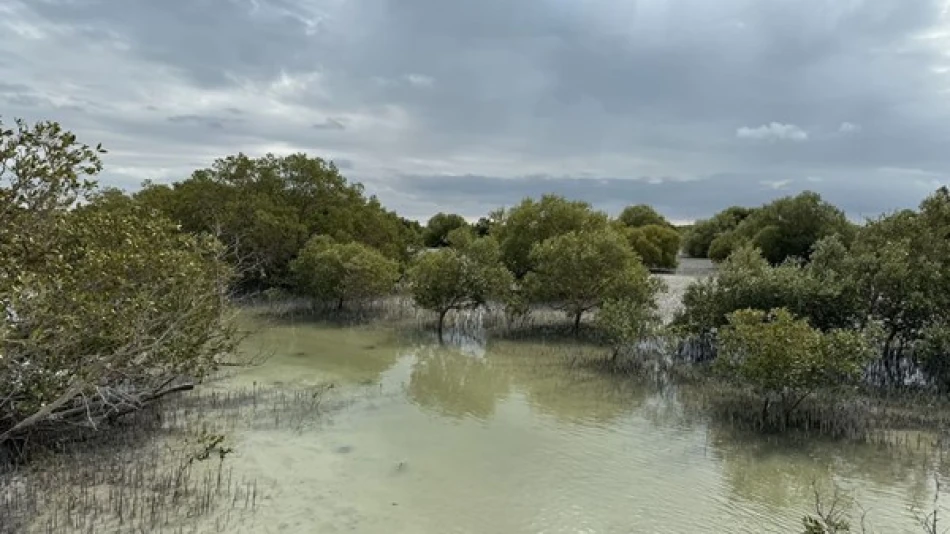
Protecting Mangrove Ecosystems: Amnah Al-Dhahak Renews Commitment
UAE Doubles Down on Mangrove Conservation as Climate Shield Strategy
The United Arab Emirates is reinforcing its commitment to mangrove protection as a cornerstone of its climate resilience strategy, with Environment Minister Dr. Amna bint Abdullah Al Dahak announcing ambitious conservation goals that position the nation as a regional leader in nature-based climate solutions. The initiative comes as Gulf states increasingly recognize coastal ecosystems as critical infrastructure against rising sea levels and extreme weather events.
Mangroves: The UAE's Natural Climate Defense System
Speaking on World Mangrove Ecosystem Conservation Day, Minister Al Dahak emphasized the strategic importance of mangrove forests that line the UAE's coastlines. These ecosystems serve as natural barriers against sea-level rise, coastal erosion, and climate change impacts—increasingly vital considerations for a nation where much of its population and infrastructure sits mere meters above sea level.
The environmental case for mangroves is compelling from a carbon perspective. These coastal forests can capture and store up to four times more carbon dioxide than tropical rainforests, making them exceptionally valuable assets in the global fight against climate change. For the UAE, which has committed to achieving net-zero emissions by 2050, mangroves represent a scalable, cost-effective carbon sequestration solution.
Ambitious 2030 Target Reflects Regional Trend
The UAE's goal to plant 100 million mangrove trees by 2030 signals a broader shift among Gulf Cooperation Council nations toward nature-based climate solutions. This approach mirrors similar initiatives in Saudi Arabia's Saudi Green Initiative and Qatar's national environmental strategy, as oil-dependent economies diversify their climate adaptation portfolios.
The timeline is aggressive but achievable given the UAE's track record in large-scale environmental projects. The Emirates has successfully transformed desert landscapes through massive reforestation efforts and has the financial resources and technical expertise to execute complex ecological restoration projects.
Global Partnerships Drive Conservation Momentum
The UAE's mangrove strategy extends beyond domestic borders through the Mangrove Alliance for Climate, which now includes 45 member countries. This multilateral approach reflects a sophisticated understanding that coastal ecosystem preservation requires coordinated international action, particularly in regions like the Arabian Gulf where marine environments cross national boundaries.
Research Infrastructure Investment
The establishment of the Mohammed bin Zayed-Joko Widodo Mangrove Research Center in Bali, Indonesia, demonstrates the UAE's commitment to scientific leadership in mangrove conservation. This facility positions the Emirates as a knowledge hub for tropical coastal ecosystem research, potentially generating intellectual property and expertise that could be exported to other developing nations facing similar climate challenges.
Economic and Strategic Implications
From an investment perspective, the UAE's mangrove initiative represents a hedge against climate-related infrastructure costs. Coastal protection through natural barriers is significantly more cost-effective than engineered solutions like seawalls or storm surge barriers. For a nation with extensive coastal development in Dubai and Abu Dhabi, mangroves offer long-term asset protection.
The biodiversity benefits also support the UAE's growing eco-tourism sector and sustainable fisheries, creating economic value streams that justify conservation investments. As global ESG (Environmental, Social, and Governance) standards tighten, the UAE's documented commitment to ecosystem preservation enhances its attractiveness to international investors and partners.
October IUCN Conference as Global Platform
The upcoming International Union for Conservation of Nature World Conservation Congress in Abu Dhabi this October will serve as a crucial platform for the UAE to showcase its environmental leadership. Hosting this prestigious gathering of conservation experts and policymakers allows the Emirates to position itself as a bridge between developed and developing nations on climate adaptation strategies.
This conference timing is strategic, occurring as nations prepare for increasingly stringent climate commitments under international frameworks. The UAE's ability to demonstrate measurable progress on mangrove conservation could influence global climate finance flows and partnership opportunities.
Most Viewed News

 Layla Al Mansoori
Layla Al Mansoori






